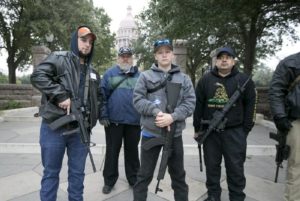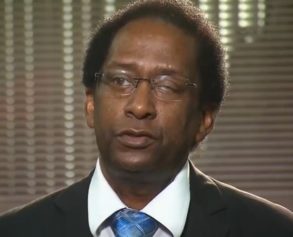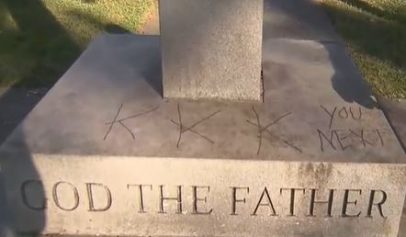
Activists who support a legislative proposal that would lift the state’s handgun licensing requirements stood outside the state Capitol on the opening day of the Texas Legislature on Jan. 13, 2015. BOB DAEMMRICH / TEXAS TRIBUNE
With Texas’ new open-carry law scheduled to take effect on public college campuses in August, the Lone Star state has given its gun-toting white men an excuse to “shoot ’em up” if there are certain “sensitive” subjects discussed in the classroom settings.
The law allows students age 21 and older to carry guns on campus, provided they are fully concealed. At the very least, someone realizes there is a problem here, hence the effort to keep the violent, edgy and armed among us happy, and decrease the likelihood of shooting up college campuses.
As the Houston Chronicle reported, faculty at the University of Houston were told recently at a meeting of the faculty senate to “not ‘go there’ ” if they sense anger, and “drop certain items” from their curriculum so as to not get involved in classroom discussion that would trigger gun usage. The suggestions reflect concerns by professors that allowing firearms in the classroom would curtail free speech and academic freedom, and limit coverage of sensitive topics.
Slide from recent campus carry dialogue at UH, in response to faculty concerns about dangers from armed students: pic.twitter.com/610RyhDZlf
— Jeff (@JeffintheBowtie) February 22, 2016
@JeffintheBowtie Also note: teachers cannot forbid firearms in class, or even ask who is carrying one. School fined $10k for violations.
— Jeff (@JeffintheBowtie) February 22, 2016
The Texas law allows private schools to ban guns on campus, which many have done, including Baylor, Rice, Texas Christian and Southern Methodist. The University of Texas at Austin, which is public, will allow weapons in classrooms but ban them in dorms as part of the “gun-free zone” option. According to data from the Texas Tribune, which maintains an updated list of Texas colleges and their gun policies, private Historically Black Colleges and Universities in the state — Huston-Tillotson University, Jarvis Christian College, Paul Quinn College, Southwestern Christian College, Texas College and Wiley College — will not allow campus carry.
The University of Houston has not decided whether it will oppose the law. However, the faculty senate opposed the measure in a resolution.
“Weapons designed to end human life have no place in the academic life of the University, except when carried by duly authorized law officers,” the resolution said, noting the numerous college and teaching associations that conclude the presence of weapons is incompatible with their educational mission.
“The diverse academic communities and free academic discourse are especially threatened by the presence of deadly weapons in teaching, research and living spaces,” the resolution also said.
“The faculty are increasingly unhappy with the law,” said Jonathan Snow, president of the senate, who is also part of a working group developing guidelines for where guns are allowed on campus. “I’ve been screamed at. I’ve been accused of complicity. It’s been kind of rough.”
The Texas campus-carry law is a recipe for disaster for college campuses, in a state with campus racial problems, a history of racial violence in which people are willing to use guns to express their racial hatred and threaten others, and an educational environment where certain subjects cannot be discussed.
A recent incident at Texas A&M University highlighted the ongoing problems of racial violence against Black students in that state. Black high school students from Dallas were subjected to racial slurs, insults and harassment from white students during their visit to the campus. Students from Uplift Hampton Preparatory say they were accosted during their campus tour, as white students told them to “go back where you came from.” Further, a female student wearing Confederate logo earrings asked the Black students if she would be able to wear her earrings at their Dallas school.
In addition, the state has created an environment where discussions about race and racism are not welcome in the educational setting. The Texas Board of Education, which presides over the majority-Black and Latino public school system, voted to whitewash the social studies textbooks, characterizing enslaved Africans as “workers.” The white Republican fundamentalists dominating the board also concluded that slavery was a “side issue to the Civil War,” rebranded the Atlantic slave trade as the “Atlantic triangular trade,” and omitted references to Jim Crow segregation and the Ku Klux Klan.
To make things worse, white supremacists and other hate groups are using open-carry as a means to back up their racist sentiments and threaten and terrorize people of color. In its annual Intelligence Report, the Southern Poverty Law Center cited the example of Irving, Texas, a Dallas suburb that is home to one of the nation’s largest mosques, and is a hotbed of Islamophobia. Of the numerous events and demonstrations that have been held there, armed men have protested in front of the mosque. Irving is where Ahmed Mohamed, 14, was sent away from school in handcuffs and detained by police after being accused of making a fake bomb.
With a climate of on-campus racism, a track record of shutting down discussions about racism in academic settings, and a tradition of white men using their guns to intimidate Black folks and get their way, Texas is headed for some trouble on their college campuses, now that guns are a part of the mix.


